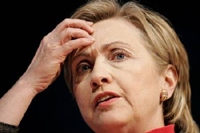US presidential candidate Clinton criticized by EU trade chief

Hillary Clinton’s doubts about the wisdom of continuing negotiations to complete a new world trade pact were criticized by the EU trade chief.
EU Trade Commissioner Peter Mandelson said in a speech that Clinton's misgivings were "misplaced." Mandelson was reacting to comments Clinton made in a newspaper interview published by the Financial Times on Monday.
In the interview, Clinton was quoted as saying that if she was elected president, she would "take stock" of U.S. trade policy and of whether the so-called Doha round of world trade negotiations are still needed or best serve the interests of American workers.
Clinton has also said she would oppose renewing the fast-track authority while U.S. President George W. Bush remains in office. That authority gives the president the power to negotiate trade deals that the U.S. Congress can approve or reject but cannot amend. The authority expired earlier this year.
"Hillary Clinton apparently believes that it is time to reflect on the value of free trade," Mandelson told a seminar on globalization. "The apparent skepticism about a Doha world trade deal that Mrs. Clinton expressed ... and her suggestion that there is a need to shelter American companies and interests from foreign investment are a disappointing sign of the times."
Mandelson hit back at what he called "a new anxiety about the openness of our economies in Europe and the U.S."
He said that while Clinton's husband, former President Bill Clinton, signed the North American Free Trade Agreement, his wife, who is a senator, was now questioning the pursuit of open economies around the world.
The global trade talks known as the Doha round aim to add billions of dollars to the world economy and lift millions of people out of poverty. But they have repeatedly stalled since their inception in Qatar's capital in 2001, largely because of wrangling over eliminating barriers to farm trade and, more recently, manufacturing trade.
Mandelson called for European nations to keep open "our own markets ... and refusing to be drawn into a downward spiral of protectionism."
He said globalization and spurring free trade pacts with trade partners were in the best interests of the EU, but backed Clinton's view that trade pacts should raise environmental and labor standards, too.
"What we should not do is respond to barriers with barriers of our own," Mandelson said.
He pointed to the increasingly sensitive debate on the role of sovereign wealth funds, which are increasingly used by oil-rich Arab Gulf states, China, Russia and others to invest in Western markets.
Mandelson said the EU should seek to establish some oversight of the government-run funds, which are used to invest in foreign assets, including strategic and sensitive areas such as finance, transport and infrastructure.
"It would be a fundamental mistake to encourage the public perception that foreign investment in our economies is, in essence, a bad thing, even when the shareholders are government-linked," Mandelson said.
He added, however, that the EU "should demand proper arrangements for the governance of government-linked investment ... and exercise some oversight when they invest in those few sectors of our economy that are genuinely strategically sensitive."
Mandelson pointed to recent examples where foreign investment became a political problem, notably Russian giant Gazprom's investments in Europe and the controversy last year over a Dubai state-owned company's attempt, which was ultimately unsuccessful, to purchase operations at six U.S. ports.
Subscribe to Pravda.Ru Telegram channel, Facebook, RSS!




